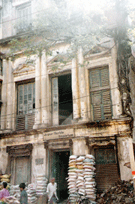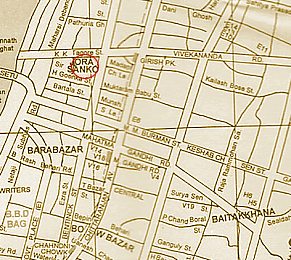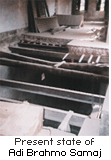 |
The first theistic church was set up on 11th Magh, 1236 (BE) or 23rd January, 1830.  Prior to this Rammohun Roy had set up the Brahma Samaj on 20th August 1828, 6th Bhadra 1234 B.E. at the house of Feranghi Kamal Bose which was rented for the occasion. Tarachand Chakravarti was its first secretary. Prior to this Rammohun Roy had set up the Brahma Samaj on 20th August 1828, 6th Bhadra 1234 B.E. at the house of Feranghi Kamal Bose which was rented for the occasion. Tarachand Chakravarti was its first secretary.
The body of worshippers who used to assemble every week in the church consecrated by Rammohun were orginally known as the Brahma Sabha and was later called the Calcutta Brahmo Samaj. It retained its name till 1866, the year of the first schsim, after which it was changed to Adi or Original Brahmo Samaj to indicate its precedence in point of time to the younger branches.
After Rammohun's  departure for England - the congregation melted away and only two people kept up the spirit of the church - they were Dwarkanath Tagore and Ram Chandra Vidyabagish (both of them were the Trustees of the Samaj as well). Dwarkanath instructed his Dewan to manage the affairs of the church and provided the money for the upkeep. Weekly service was held originally, every Saturday evening; later it was transferred to Wednesday. It consisted of three successive parts, viz. recitation of the Vedas by Telegu Brahmins in the closed apartment exclusively before the Brahmin members of the congregation, reading and exposition of the Upanishads for the general audience, and singing of religious hymns. The reading of the vedas was done exclusively before the Brahmin participants as the orthodox Telegu Brahmin community and its members could not be persuaded to recite the Vedas before Brahmins and non-Brahmins alike. departure for England - the congregation melted away and only two people kept up the spirit of the church - they were Dwarkanath Tagore and Ram Chandra Vidyabagish (both of them were the Trustees of the Samaj as well). Dwarkanath instructed his Dewan to manage the affairs of the church and provided the money for the upkeep. Weekly service was held originally, every Saturday evening; later it was transferred to Wednesday. It consisted of three successive parts, viz. recitation of the Vedas by Telegu Brahmins in the closed apartment exclusively before the Brahmin members of the congregation, reading and exposition of the Upanishads for the general audience, and singing of religious hymns. The reading of the vedas was done exclusively before the Brahmin participants as the orthodox Telegu Brahmin community and its members could not be persuaded to recite the Vedas before Brahmins and non-Brahmins alike.
Debendranath Tagore joined the Samaj in 1843 and it was Vidyabagish who administered the initaiation service. In 1844 Vidyabagish died in Murshidabad on his way to Benares and it seemed that from the day of Rammohun's death he was waiting for some worthy successor to make over to him the sacred charge that his departed master had entrusted to him. Debendranath introduced the much needed dynamism in to the Samaj. The Tattwabodhini Sabha was established in 1839. A notable doctrinal change that took place was the abandonment of the belief in the infallibility of the Vedas. Along with initiation came the special status of membership system or compulsory subscription for the initiated was introduced. In the anniversary festival of 1849 there was special enthusiasm among the members - there was new music, new covenant and a new form of service. In addition to the third storey there was new marble bedi (pulpit) in the Samaj building. the initaiation service. In 1844 Vidyabagish died in Murshidabad on his way to Benares and it seemed that from the day of Rammohun's death he was waiting for some worthy successor to make over to him the sacred charge that his departed master had entrusted to him. Debendranath introduced the much needed dynamism in to the Samaj. The Tattwabodhini Sabha was established in 1839. A notable doctrinal change that took place was the abandonment of the belief in the infallibility of the Vedas. Along with initiation came the special status of membership system or compulsory subscription for the initiated was introduced. In the anniversary festival of 1849 there was special enthusiasm among the members - there was new music, new covenant and a new form of service. In addition to the third storey there was new marble bedi (pulpit) in the Samaj building.
Keshub Chandra Sen joined the Samaj in 1857. With the devotional fervour of Keshub - the Samaj entered upon a new career of spiritual activity and practical usefulness. The number of candidates for initiation into the new faith increased every week and its annual meetings used to draw unusually large crowds. The new hymns composed by Satyendranath Tagore became a subject of talk in Calcutta. From 1858 it became a custom to hold an annual meeting of the members of the Brahmo Samaj and drawing an annual report of the progress of the Samaj and also appointment of office bearers. At this time the affairs of the Samaj were being managed by the Tattwabodhini Sabha and Pt. Iswar Chandra Vidyasagar was its secretary. In 1859 the Tattwabodhini Sabha was abolished and the propagatroy work was taken up by the Samaj - the printing press, library and other properties were made over to the Trustees of the same. Vidyasagar could not agree with the changes introduced and resigned from his post. fervour of Keshub - the Samaj entered upon a new career of spiritual activity and practical usefulness. The number of candidates for initiation into the new faith increased every week and its annual meetings used to draw unusually large crowds. The new hymns composed by Satyendranath Tagore became a subject of talk in Calcutta. From 1858 it became a custom to hold an annual meeting of the members of the Brahmo Samaj and drawing an annual report of the progress of the Samaj and also appointment of office bearers. At this time the affairs of the Samaj were being managed by the Tattwabodhini Sabha and Pt. Iswar Chandra Vidyasagar was its secretary. In 1859 the Tattwabodhini Sabha was abolished and the propagatroy work was taken up by the Samaj - the printing press, library and other properties were made over to the Trustees of the same. Vidyasagar could not agree with the changes introduced and resigned from his post.
On July 1861 - the second daughter of Debendranath - Sukumari was married as per the reformed rites of the Brahmo Samaj. A new zeal for propagation of Brahmoism took possession of the souls of the young members. They received a moral boost with Bijoy Krishna Goswami joining the Samaj. In 1862 Keshub was ordained as the Acharya (minister) of the Samaj - the first non-Brahmin to reach this position. But in later years towards 1864 serious differences regarding creed, rituals and the attitude of the Brahmos to the social problems of the day, had arisen between Debendranath and Keshub, men of radically different temperaments and the Samaj soon split up into two groups- the old conservatives rallying round the cautious Debendranath and the young reformists led by the dynamic Keshub. Keshub organised a Brahmo Pratinidhi Sabha or Representative Assembly in October 1864 with the object of securing the voice of the general body of the Brahmos in controlling the affairs of the Samaj. At this time the Samaj had been shifted to Debendranath's house owing to repairs being carried out there. Here on one occassion Bijoy Krishna Goswami stood at the doorway and prevented the young people from attending the service in protest against former acharyas who had refused to give up their sacred thread occupying the pulpit.
In light of this Debendranath removed all young  persons from all office and power of the Samaj. As the sole Trustee he resumed charge of all affairs of the Samaj. A new council was appointed having the senior members in it. His eldest son Dwijendranath Tagore and Pt. Ayodhanath Pakrashi were appointed as Secretary and Asst. Secretary of the Samaj. He also took charge of the Tattwabodhini Patrika from the hands of the younger party. By the year 1865 the church had broken up into two hostile camps. After the anniversary festival a requisition signed by a large numer of Brahmos was sent to the authorities asking for a public meeting of the Brahmo community in the hall of the Samaj. This was to settle the question as to rights of the Brahmo public to the management of the Calcutta Brahmo Samaj. Needless to say that the permission was refused. Soon there was struggle over the Indian Mirror. Debendranath and his party claimed that the Indian Mirror was theirs because of the monetary contributions while Keshub said that it was morally his because of its editorial responsibilities. As the paper was printed from the Samaj press Debendranath refused Keshub to have any access to the printing establishment thinking that it will desist Keshub. But within a fortnight Keshub published the Mirror from an independent press and launched a scathing attack on the high handedness of the Calcutta Brahmo Samaj. Debendranath dis not assert his proprietory right on the Mirror and a fresh English weekly - National Paper became the organ of the Adi Brahmo Samaj. persons from all office and power of the Samaj. As the sole Trustee he resumed charge of all affairs of the Samaj. A new council was appointed having the senior members in it. His eldest son Dwijendranath Tagore and Pt. Ayodhanath Pakrashi were appointed as Secretary and Asst. Secretary of the Samaj. He also took charge of the Tattwabodhini Patrika from the hands of the younger party. By the year 1865 the church had broken up into two hostile camps. After the anniversary festival a requisition signed by a large numer of Brahmos was sent to the authorities asking for a public meeting of the Brahmo community in the hall of the Samaj. This was to settle the question as to rights of the Brahmo public to the management of the Calcutta Brahmo Samaj. Needless to say that the permission was refused. Soon there was struggle over the Indian Mirror. Debendranath and his party claimed that the Indian Mirror was theirs because of the monetary contributions while Keshub said that it was morally his because of its editorial responsibilities. As the paper was printed from the Samaj press Debendranath refused Keshub to have any access to the printing establishment thinking that it will desist Keshub. But within a fortnight Keshub published the Mirror from an independent press and launched a scathing attack on the high handedness of the Calcutta Brahmo Samaj. Debendranath dis not assert his proprietory right on the Mirror and a fresh English weekly - National Paper became the organ of the Adi Brahmo Samaj.
At the time of the schism there were 54 Samajes in India, 50 in Bengal, 2 in North Western Province, one in Punjab and the other in Madras. Besides the Calcutta College, there were boys and girls schools in Chandernagore, Bhastara, Gournagar, Konnagar and boys' school at Ranchi, Burdwan, Behala, Bareilly, Nibadhoy. There were 37 periodicals for the spread of Brahmoism. The Urdu version of the Tattwabodhini Patrika was published from the North Western province and the Telegu version by the Veda Samaj from South India. Western Province, one in Punjab and the other in Madras. Besides the Calcutta College, there were boys and girls schools in Chandernagore, Bhastara, Gournagar, Konnagar and boys' school at Ranchi, Burdwan, Behala, Bareilly, Nibadhoy. There were 37 periodicals for the spread of Brahmoism. The Urdu version of the Tattwabodhini Patrika was published from the North Western province and the Telegu version by the Veda Samaj from South India.
After the schism, the Adi Brahmo Samaj quietly retreated to its position of Hindu monotheism - and Debendranath remained silent and never replied to any of the accusations. He also retired from active work of the Samaj and appointed Rajnarain Bose as its President. He spent most of his time travelling and occasionally visiting Calcutta. The Adi Brahmo Samaj voiced its opposition to the Marriage Act of 1872 and sent a petition against it. Adi Brahmo Samaj has pursued a course of  unobstrusive existence, marked by a singular absence of all reformatory zeal or propgandist activity. Pt. Becharam Chatterjee rendered his service in keeping the work of the Adi Samaj in Bhowanipore, southern suburbs and in his native village of Behala. unobstrusive existence, marked by a singular absence of all reformatory zeal or propgandist activity. Pt. Becharam Chatterjee rendered his service in keeping the work of the Adi Samaj in Bhowanipore, southern suburbs and in his native village of Behala.
Later on under the influence of Rabindranath, Adi Brahmo Samaj was showing signs of revival. The old rule of allowing Brahmins to the pulpit were being relaxed and men of other castes were being invited into it. The Tattwabodhini Patrika had secured a new band of writers and young men trained under Rabindranath came forward to take up the work of the Samaj. |
|
|
|
|
|
|
|